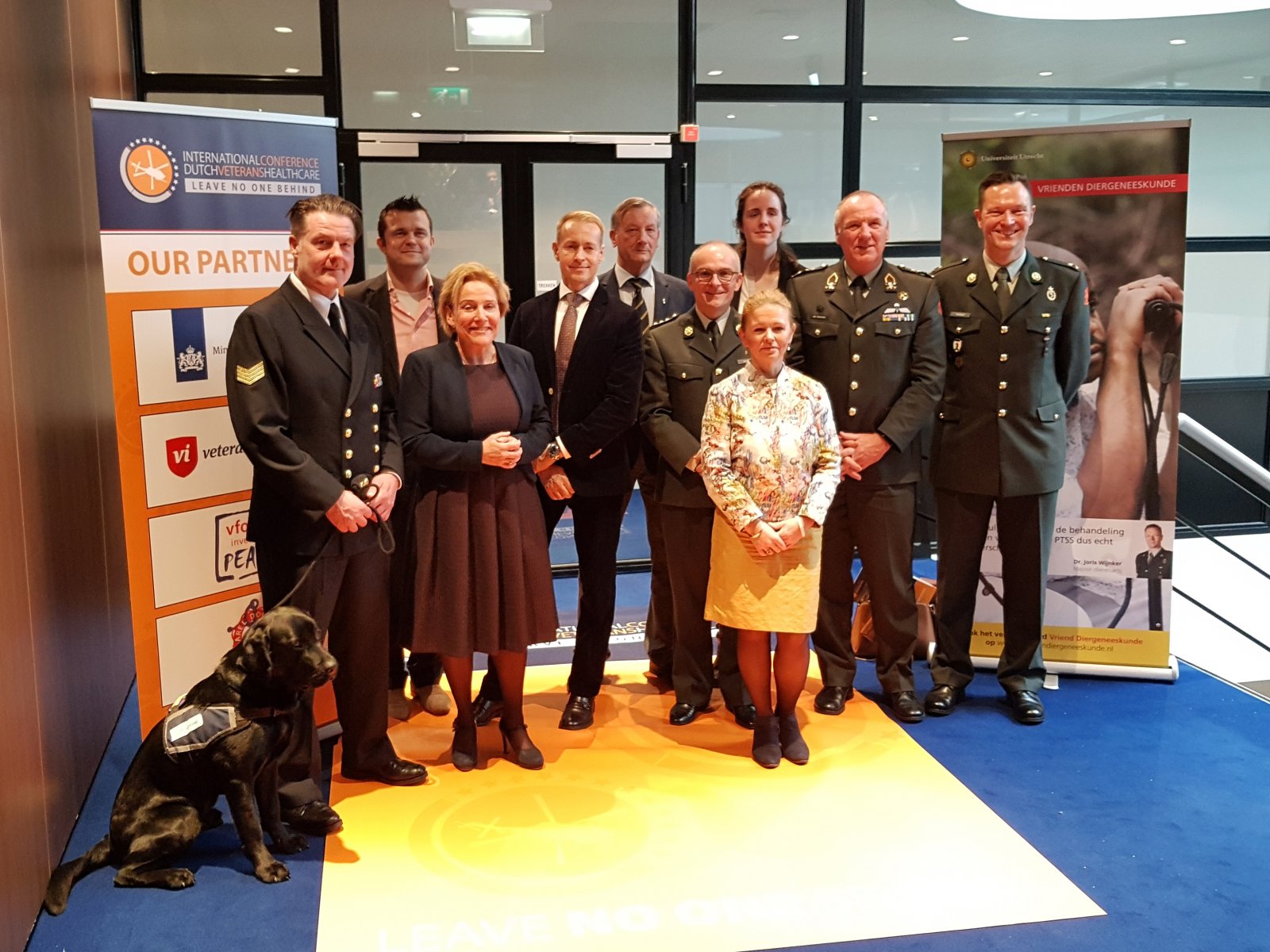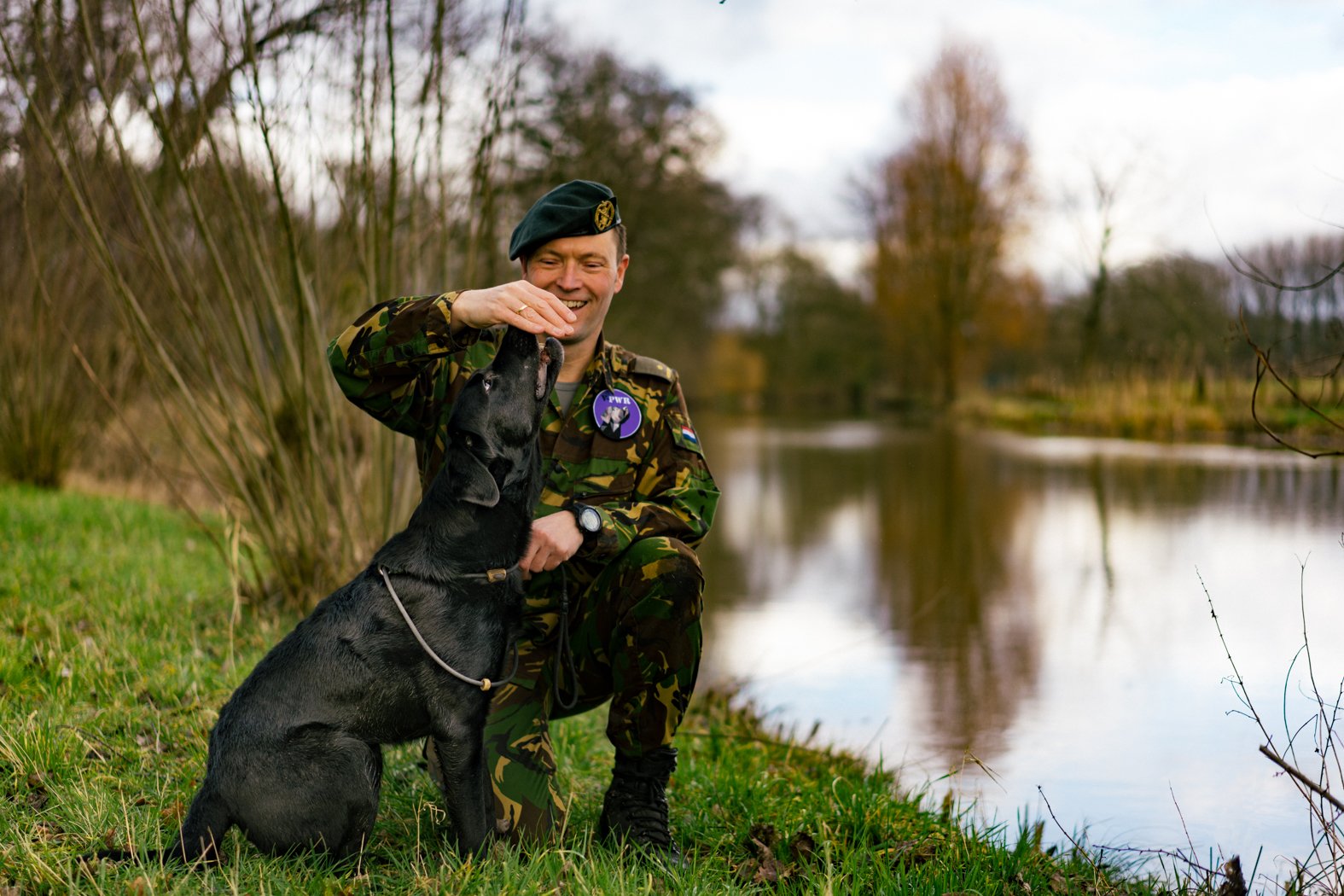Support for research into relationship between service dog - veteran with PTSS
A consortium of social partners, including the Ministry of Defence, Stichting Hulphond Nederland, the Karel Doorman Fund, Triodos Foundation, and Royal Canin have joined together to support Utrecht University’s Faculty of Veterinary Medicine in its research into the interaction between service dogs and veterans with Post-Traumatic Stress Syndrome (PTSS). The purpose of this study is to identify the mechanism of the interaction between humans and animals, and to be able to objectively measure it. The goal is to continue to optimise the use of service dogs to help veterans, so that they can meet the veteran’s individual needs.

From left to right: Wolf de Wilde and service dog Zayne - Veteranen Instituut; Bram van Schaik - Royal Canin; Minister of Defense Ank Bijleveld; Rudolph Strickwold - Stichting Hulphond; Henk van de Beek - Karel Doormanfonds; Eric Vermetten – MGGZ; Nienke Endenburg - Faculty of Veterinary Medicine; Emmy van Houtert - Faculty of Veterinary Medicine; Hans van Griensven - Inspector General of the Military Forces; and Joris Wijnker-Faculty of Veterinary Medicine.
The project is extremely urgent, explains Lieutenant General Hans van Griensven, Inspector General of the Military Forces. “Every year, Dutch servicemembers commit to ensuring peace and security around the world. In the course of their duties, they occasionally experience circumstances that are so severe that they can become mentally or physically injured, which can lead to the development of post-traumatic stress syndrome (PTSS). For a veteran who does not respond to conventional treatment, a service dog can often be the ideal solution.” Van Griensven will provide support to the study. “We think that it is important that service members who have devoted years of their lives to protecting Dutch society can continue to be self-reliant after their term of service, even if they have become injured along the way.” The Bond van Nederlandse Militaire Oorlogs- en Dienstslachtoffers (Union of Dutch Military Victims of War and Service, BNMO) also supports this project. General Chairperson, Major General Bert Dedden (Ret.): “We have set up a special service dog programme for all of our members, because experience has taught us that a service dog can make all the difference for a traumatised veteran.”
Measuring interaction between dog and veteran
Dr. Joris Wijnker, Veterinarian-Major at the Ministry of Defence and researcher at the Faculty of Veterinary Medicine, is the project leader of the Veteran-PTSS-Working Dog Research Project: V-PWR. “We have noticed that service dogs assigned to veterans with PTSS have a positive influence on their lives. These positive results are mainly based on subjective experiences and self-reflection.” The research will focus on obtaining more and better insight into the interaction between the veteran and the service dog. Wijnker: “We will begin our study by measuring a number of parameters, such as heart rate, blood pressure, movement patterns, and other stress indicators, such as the hormone cortisol. We will also conduct similar measurements on the dog. Using tools such as smartwatches, we will then be able to identify how the veteran and the service dog feel, both mentally and physically. Based on the military’s experience in this area, other uniformed services, such as the police, fire brigade and ambulance service, are also paying more attention to this problem, because they too have people who suffer from the effects of PTSS”, Wijnker explains.

Crowdfunding for further research
This project depends on external sources of funding. “Without our partners’ financial contributions, we would not be able to conduct this research. So the more support we receive in the form of donations, the more research we can do, and the better we can help veterans and other service men and women with PTSS. Via the Friends of Veterinary Medicine, the charitable fund set up by the Faculty of Veterinary Medicine, anyone who has an affinity with veterans can contribute to our research. That way, we can give something back to the brave men and women who put their lives on the line to protect our society.”
To make a donation, please visit: www.vriendendiergeneeskunde.nl.
The Faculty of Veterinary Medicine at Utrecht University is the premiere veterinary knowledge centre in the Netherlands. The faculty offers innovative and impartial research, the highest level of specialist care to animals, and high-quality education. With its expertise in the field of veterinary medicine, the faculty provides a valuable contribution to social debate on the welfare of animals in relation to humans and their surroundings. This is more vital than ever today, because many issues pertaining to human health and welfare are related to similar issues in the field of animal health. The Faculty of Veterinary Medicine is unique in that it has knowledge and expertise of every level of animal health and welfare: from cell, to organism, to population. The faculty is ranked fifth in the QS World University Rankings.

